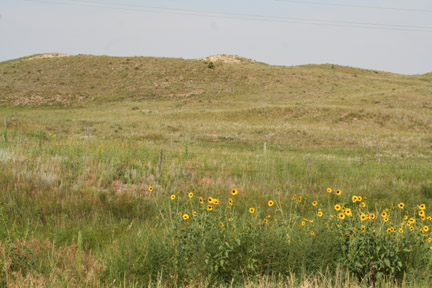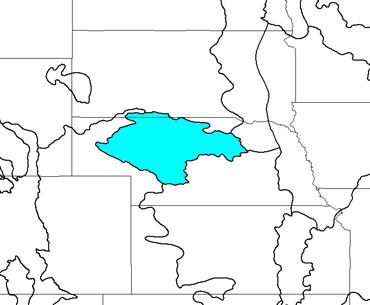
Sand Hills east of Valentine, Nebraska (c) 2008 Steven J. Baskauf
Bioimages home (click on an image to enlarge)
view
this page in its intended navigation context
Nebraska Sand Hills Mixed Grasslands
(WWF
ecoregion NA0809)

Sand Hills east of Valentine, Nebraska
(c) 2008 Steven J.
Baskauf

Source of bioregions data:
Olson, D. M. and
E. Dinerstein. The Global 200: Priority ecoregions for global conservation. (PDF
file) Annals of the Missouri Botanical Garden 89:125-126.
Distinctiveness (1=highest,4=lowest): 4
(nationally important)
Although this ecoregion shares many of the species of surrounding ecoregions, it
is unique due to the soil and surface characteristics caused by the irregular
dunes and sandy soils.*
Conservation Status (1=most endangered, 5=most
intact): 4 (relatively stable)
Because of the sandy soil, very little of this ecoregion has been plowed and it
is about 85% intact. Threats are degradation by overgrazing and toward the
eastern end, development.*
 Schizachyrium scoparium
(little bluestem)
Schizachyrium scoparium
(little bluestem)
Some views from the ecoregion
sandhills prairie


east of Valentine, Nebraska
(c) 2008 Steven J.
Baskauf hires
hires

sand substrate in downtown Valentine, Nebraska
(c) 2008 Steven J.
Baskauf
hires
wooded river valley


west of Valentine, Nebraska
(c) 2008 Steven J.
Baskauf hires
hires
* Ricketts, T.H., E. Dinerstein, D.M. Olson, C.J. Loucks, et al. (1999) Terrestrial Ecoregions of North America: A Conservation Assessment. World Wildlife Fund - United States and Canada. Island Press, Washington, D.C. pp. 190-191.